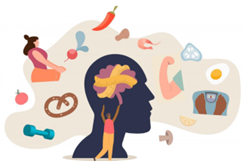Eating disorders are some of the most complex and hard-to-treat mental health conditions. Early diagnosis is essential to avoid severe complications, including death, that can result when the condition is allowed to progress. To offer someone with an eating disorder appropriate support, you must recognise the early warning signs.
Fixation on food
People who never used to be interested in calorie counts or nutrition may suddenly become an expert in all things dietary, watching every program and reading every article.
Changing eating habits
Many people with eating disorders start changing their eating habits in small ways. They may break their food into smaller pieces, push it around their plate, or add excess seasoning and condiments. Perhaps they become fixated on eating at certain times or using particular cutlery. Other changes could include either limiting their consumption to just a few foods or embarking on a completely new diet such as vegetarianism.
Shifting moods
Mood swings can be a symptom of many mental illnesses or a natural part of daily life. But for people with eating disorders, they often occur just before and during mealtimes. You may notice irritation, tearfulness or anxiety, potentially with physical manifestations such as fidgeting. These mood swings sit alongside other generic indicators of distress, such as excess tiredness or periods of depression, which need to be distinguished from other conditions.
There are also signs linked to specific eating disorders, such as rapid, extreme weight loss in anorexia. Specialised mental health training courses Swansea may help you to identify the different disorders.
By recognising these signs, you will hopefully be able to identify eating disorders earlier and respond appropriately. Professionals who work with people with eating disorders may benefit from mental health training courses in Swansea to further improve their understanding.

